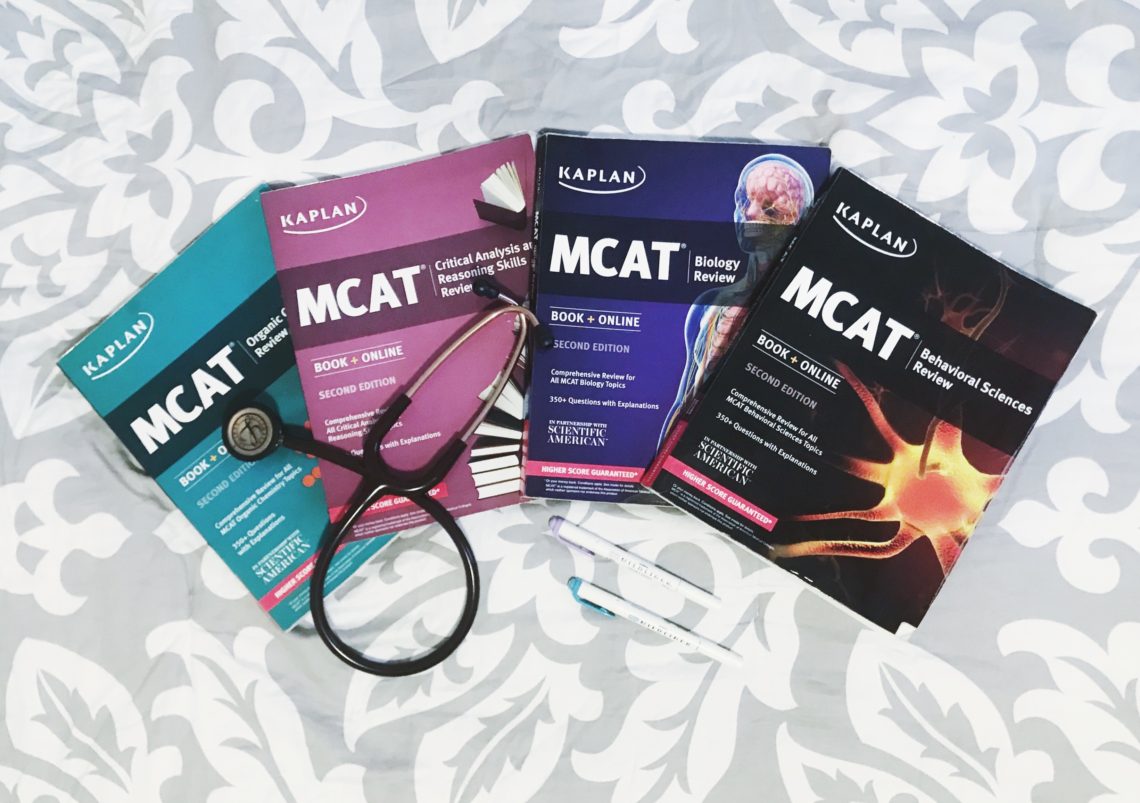
MCAT Study Tips: How to improve your score
If you read my previous post then you know all about my MCAT (Medical College Admission Test) struggles. If not, you can check it out here! During my last gap year, I really focused on how to improve my MCAT score. I spent hours researching anything I could do to get a higher score. All in all, I would say I found some valuable information that I didn’t have in previous years. My first practice test was 493. My best practice test score was 508! I scored 502 on my actual test, so these tips helped me gain 9 points overall.
Here are five things you MUST try to improve your MCAT score.
Find a MCAT tutor
At some point along my MCAT journey, I finally realized that studying alone was not the option for me. I desperately needed someone to teach me how to think like the AAMC test writers. I couldn’t afford to take an MCAT course, so I decided to look into other learning resources.
There are many private tutoring options for the MCAT. From Kaplan to Princeton Review, Varsity Tutors to NextStep. I eventually found a tutor on one of the SDN forums. When looking for a tutor, find someone who is:
- Affordable– My tutor charged $45/hour but tutoring rates can range from $20-$45/hour.
- Experienced– You want a tutor who has experience with teaching and who scored well on the MCAT. Don’t forget to ask for references from some of their previous students.
- Flexible- Find someone with a flexible schedule. This is especially important for students who are working or have other commitments.
All of these factors are equally important. I was working as a Chief Medical Scribe while studying for the MCAT, so I needed someone patient who would understand that there would be times when I would have to reschedule a session.
Another important factor is how the session is structured. Tutoring is meant to help tackle specific questions and understand specific topics. Before each session, my tutor would assign 1-2 MCAT topics and send me a problem set. I reviewed the chapters associated with the topics on my own, then completed the practice sets. During the session we discussed each question in detail. I would start by explaining my thought process for why I chose a certain answer. If I answered correctly, YAY! If not, then he would explain his thought process. This type of one-on-one interaction was really helpful because for the first time, I was actually learning how to attack these questions.
Meditation
Taking the MCAT is a stressful experience. Not only is the test long, but there is a lot of pressure to do well. A couple of issues that I had were focusing and test anxiety. I found myself losing focus while reading the passages and questions. Sometimes I would catch myself rereading the questions 2-3 times before getting so frustrated that I would just skip to the next one. I was also so anxious during the exams that I would second guess my answers.
A great way to improve focus and reduce anxiety is through meditation. I never thought much of meditation until I started researching the benefits, which include:
- Reducing stress
- Controlling anxiety
- Lengthening attention span
- Lowering heart rate
For more information on the science behind meditation, check out this article on Healthline.
There are so many ways to incorporate meditation into your study schedule. You can try yoga, listening to calm music or just sitting in a quiet area for a period of time. I began to meditate before all of my practice tests. I would sit still for 5-10 minutes and focus on clearing my mind. Now clearing my mind was not easy. When I first started, I would catch myself thinking about all these random things like what I would eat for lunch, how I would do my hair or worries about how I would perform on the test. Sitting in a quiet room did not work for me. I began playing soothing piano music to help drown out my thoughts. During the 5-10 minutes, I would focus on the rhythm of the music and that would keep me from thinking about anything else.
Overall, I found meditation to really help with my focus (once I figured out how to do it right). I am NOT an expert but check out this article to learn more tips. Even with the small amount of time, I could tell that my attention span was improving. I was able to comprehend the passages and questions without having to read them a bajillion times.
Review MCAT practice tests in depth
If you have been researching the MCAT and how to improve your score, you may have seen many articles telling you to take as many practice tests as possible. My tutor had me take a practice test once every 1-2 weeks while reviewing content. Then once a week for the month leading up to the exam. This will help you get used to how the test is structured, timing, and practicing your test-taking strategies. You want to make sure your strategies become habits that come naturally on test day. It is not helpful to try new methods during your actual test.
While practice tests are important, what you do after the test is EVEN MORE important. Review your test results in depth. I went through EVERY SINGLE QUESTION after taking a practice test. Here is an example of how I reviewed my practice tests using a tracker from mcatquestion.com.
The spreadsheet organizes the questions by topic and calculates the amount correct. It also provides a list of possible reasons why you might have missed the questions. So you really have to think about what caused you to miss the question. After doing this, I reviewed the results and made sure I understood what topics I needed to review the following week. The spreadsheet also helped me realize that I was not taking the test efficiently. I wasted so much time on difficult questions or passages. If I hadn’t reviewed my practice tests, then I would have never known that was an issue.
Track your progress
Another good habit is tracking your progress. I created my own spreadsheet that I used to log my scores for each section. I compared each practice test to the last and it gave me a confidence boost. Initially, I wasn’t seeing any progress, but overtime my score began to improve. If you think you aren’t getting anywhere, start tracking your progress to see how far you have come. Seeing the progress with your own eyes may be helpful. The one thing you want before taking the test is confidence!
Sleep!
Last, but certainly not least, make sure you are taking time to rest. So simple!
You put in hours on top of hours every week studying for the MCAT. Not to mention, all of your other responsibilities. Imagine spending all that time studying new concepts, but not retaining that information. This is what happens during sleep deprivation. During a good night of sleep, short term memories are converted to long term memories through a process is called consolidation.
To learn more about the effects of sleep deprivation, check out this article:
If I’m being honest, managing sleep is very hard for me. I am the definition of a night owl. Usually, I plan to go to bed early and then somehow manage to fall into a google search hole about how to care for succulents (or some other random topic). I would also stay up worrying about how I would do on my practice test the next day. It took me a while to realize how important it is to find time to rest and restore my body and mind.
BONUS TIP:
I prayed that I would perform well before every study session, practice test and the actual test. I prayed that I would retain and recall the information. So if you believe in the power of prayer, don’t forget to add that to your study plan.
Those are my 5 tips that really helped me improve my MCAT score. Now obviously this is what worked for me. I would encourage you to try a few of them and see how they fit into your plans. If you have any more tips and tricks that helped you, please comment them below! I would love to learn more study tips!




